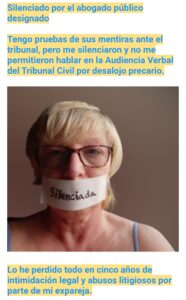The use of precarious eviction ( desahucio por precario ) in Spain to evict a long-term unmarried partner, particularly when the woman was financially dependent, raises significant moral and ethical concerns, even if it may be legally permissible under certain circumstances. Here’s a breakdown of the issue:
 1. Legal Framework and Its Limitations
1. Legal Framework and Its Limitations
Spain’s gender-based violence laws (e.g., Ley Orgánica 1/2004) recognise economic abuse and psychological harm as forms of violence. However, civil courts handling evictions often ignore these protections unless a criminal gender violence case is already pending. Even then, survivors struggle to prove abuse or access safeguards.
 2. Moral and Ethical Considerations
2. Moral and Ethical Considerations
Women are disproportionately affected by such evictions due to factors like lower earnings, caregiving roles, and higher rates of economic dependency in relationships. Systemic biases in the justice system further compound this inequality.
 3. Real-World Consequences
3. Real-World Consequences
Abusers may use precarious eviction as a tool of post-separation harassment, knowing civil courts prioritise property rights over human safety. This legal strategy silences victims and avoids scrutiny of abusive behaviour.
 4. Efforts to Address the Gap
4. Efforts to Address the Gap
Article 57. Loss of objective jurisdiction when acts of violence against women occur, Article 49 bis.
which requires civil judges to suspend civil proceedings if gender violence is suspected and refer the case to specialised courts. However, this is poorly enforced, and many victims (especially non-Spanish speakers) are unable to assert their rights, as I discovered to my cost.
Legal assistance falls under Article 20 of the 1/2004 laws introduced in Spain for comprehensive protection measures against gender violence. Victims of gender-based violence have the right to free legal advice immediately before filing a complaint, and to free defence and representation by a lawyer and solicitor in all administrative proceedings and procedures directly or indirectly caused by the violence suffered.
 5. Alternatives to Precarious Eviction
5. Alternatives to Precarious Eviction
Check the occupant’s contributions to the household.
 6. The Human Rights of Women to Live a Life Free from Violence
6. The Human Rights of Women to Live a Life Free from Violence
When a romantic partner is using a legal mechanism like “desahucio por precario” in a way that creates extreme vulnerability for a woman, this can be seen as a violation of her fundamental human rights. At the breakdown of a non-married relationship, many couples can communicate, discuss and negotiate a fair and equitable separation. Couples can separate and avoid the need for legal representation and litigation.
However, when there has been any form of gender violence before the separation, the situation can quite quickly escalate.
How the relationship ended should be taken into account; the defendant should always have the right to put their side of the story.
The Link Between Precarious Eviction and Violence:
- When a former romantic partner is using precarious eviction, especially when it leaves a financially dependent woman homeless, it can be a form of “economic violence” or an act of “coercion and control”. This is particularly relevant when the partner is also the victim of physical or psychological abuse. It becomes an act of “Post Separation Abuse”.
- The use of the legal system to cause such harm is a profound ethical failing and an abuse of power. The act of eviction, in these cases, is not just about property law but is a tool of violence—weaponisation of litigation as legal intimidation.

I have lost everything in five years of legal intimidation and litigious abuse by my ex-partner.
The Role of Spanish Courts in Upholding Human Rights:
Judges need to apply a human rights lens to property law cases. The courts have a responsibility not only to apply the letter of the law but also to ensure that their rulings do not create or perpetuate a human rights violation. Precarious eviction should not be seen as a “simple legal procedure” in situations between couples who have been in long-term romantic relationships.
Questions need to be asked. Plaintiffs need to be interrogated about the reason for bringing the case to litigation. There needs to be a clear understanding of the position of the defendant in all cases before the courts. A consideration must be made on the loss of jurisdiction in gender violence cases and explain how this legal reform is a step toward upholding these human rights obligations.
International and European Legal Frameworks:
Spain has signed and ratified the Convention on the Elimination of All Forms of Discrimination against Women (CEDAW), which obligates states to eliminate discrimination against women in all its forms, including in legal matters. Spain has also ratified the Istanbul Convention (Council of Europe Convention on preventing and combating violence against women and domestic violence). This convention specifically recognises domestic violence as a human rights violation and requires states to take comprehensive measures to protect victims.
Serious Human Rights Issues
While desahucio por precario may be a valid legal tool in some contexts, its application to vulnerable, financially dependent partners can be a violation of their right to a life free from violence and discrimination. This issue is not just about a legal loophole but a serious human rights problem that the Spanish legal system is increasingly challenged to address. Bias, discrimination and misogyny have no place in the Justice system or in the legal profession. Despite the advancement of Spanish legislation in the fight against gender based violence, it seems that there are still some failings within the systems in place. The use of desahucio por precario in situations between couples who have spent many years in a relationship seems to be draconian and barbaric. This is 2025, not 1955, when women were thrown to the curb without a second thought.
 Key Comparisons: Legal vs. Ethical Obligations
Key Comparisons: Legal vs. Ethical Obligations
 Conclusion
Conclusion
4. Ensure that Police, Legal Professionals, Social Workers, Therapists, and Judges are fully trained and are “trauma-informed” to understand and work within the legislation of the comprehensive protection measures against gender violence. To avoid the secondary victimisation and “institutional sexist violence” that can occur.
Until then, using precarious eviction in such cases prioritises technical legality over justice and humanity. For more details on advocacy efforts and legal reforms, you may refer to the sources cited.
Legal and resource articles.
LifeChangPlans: Highlighting Gaps In the Laws That Fail Women
Recommended Reading – “As an Amazon Associate, I earn from qualifying purchases”
Support LifeChangePlans: Helping Survivors Move From Trauma to Transformation
Despite immense challenges, I refuse to be defined by this experience. I am channelling my survival into a powerful vision: the creation of a Country Park Retreat and Motorhome Campsite – a sanctuary for healing and personal growth born from the ashes of my trauma. Furthermore, I am committed to establishing a non-profit in Spain to empower other survivors of domestic abuse, helping them to rebuild their lives and achieve financial independence.


 1. Legal Framework and Its Limitations
1. Legal Framework and Its Limitations 5. Alternatives to Precarious Eviction
5. Alternatives to Precarious Eviction Key Comparisons: Legal vs. Ethical Obligations
Key Comparisons: Legal vs. Ethical Obligations Conclusion
Conclusion